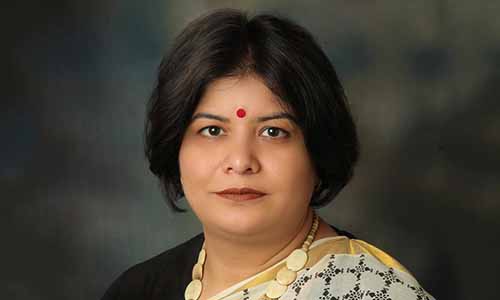At ESSCI, We are fully prepared to Provide The Necessary Manpower for The Semiconductor Initiative in The Country’s Entire Ecosystem and Support The Semiconductor Sector
Electronics Era : How do you see the current rapid movement in terms of semiconductor manufacturing in India?
Dr. Abhilasha Gaur : The semiconductor business is going through a really exciting time right now. Not only are semiconductors used in computers and cars, but they are also found in many household goods. Therefore, semiconductors will be a little component that will be used in almost every automobile, appliance, and industry, including Industry 4.0, mechatronics, and robotics.
Therefore, I believe there is a huge market for semiconductors, and many different talent and skill sets will be needed in this industry, from semiconductor memory packaging to a competent workforce to work in the entire semiconductor value chain. It is therefore a really exciting period the country is passing through currently.
At ESSCI, we are fully prepared to provide the necessary manpower for the semiconductor initiative in the country’s entire ecosystem and support the semiconductor sector.
Electronics Era : After various Government policies and schemes, lots of developments took place in
Dr. Abhilasha Gaur : The last few months for semiconductor manufacturing in India. How do you seeThis?
The Indian Government is committed to see the fab come up in Indias at the earliest and has approved a semiconductor FAB in Gujarat recently. The government of India has various incentive programmes to promote electronics manufacturing in the country. The programmes like the “Performance linked Incentive” (PLI) for supporting major manufacturing facilities under the PLI scheme for manufacturing and the Semicon India Program, a unique programme for electronics and semiconductors.
There are also EMC clusters, of which the Government has already approved 22 EMC clusters across the country. These clusters will manufacture electronics components and products needed to support the large electronics units.
The Government estimates that the electronics sector will will need more than 25 lakh personnel over the next three years.The demand for skilled manpower is expected to be high in the country and the country will not only provide to meet the country’s demand but also supply skilled manpower to developed economies in Europe, America, and Japan , as they age and replenishment of the retiring manpower would definitely come from countries like India.
Electronics Era : Do you believe the Government’s ongoing semiconductor manufacturing scheme is sufficient? suggest some more policies?
Dr. Abhilasha Gaur : Demand and supply are the foundation of each of these industries, and semiconductors are in high demand. Because producing semiconductor fabrication requires at least $8 to $10 billion in investment and is impossible without government help, India is currently pushing multinational firms to invest through its soft policies.
However, the Government is now quite supportive and two semiconductor fabs have already been approved, one in Gujarat and the other one of a lower capacity and for memory packaging in Mysore.
Companies like Reliance and HCL have expressed interest in making investments in semiconductor production. Therefore, I believe a sizable amount of private funding will be available to make sure the fab is implemented across the nation. However, without Government support and intervention, it may not be possible.
Electronics Era : Talking about the DLI scheme, the focus on designing infrastructure is great to see, but, should the Government ignore intellectual property regulation because it is complicated?
Dr. Abhilasha Gaur : That is a complicated topic, the Government is doing everything it can to assure that they have a very constitutional atmosphere. We discuss the DLI and intellectual property as a highly complicated topic because it takes a lot of time and money to develop an Intellectual Property (IP).
The Government will therefore need to ensure a fair playing field. In this regard, I believe the Government is acting cautiously and taking all reasonable measures to protect each person’s IP rights as the nation completely scales up to ensure coverage of the entire country in terms of skilled manpower supply.
Electronics Era : Apart from investment and policies the semiconductor fabrication process is an ecosystem.
Dr. Abhilasha Gaur : According to you, is Indian infrastructure enough to maintain that ecosystem?
Although India does not yet have full-fledged fabrication, the Government’s ambition to establish an Indian semiconductor mission is evident from the positive steps it has taken. It is reassuring to see how determined top Government officials are to make it happen. As those products arrive in India, it is also a subject of national pride. The country is receiving the appropriate policy assistance, infrastructure support, and leadership support from the Government.
Therefore, I think the fabrication in India will materialise quickly since it is market-driven. The need for semiconductors is enormous worldwide. India is a sizable nation, and since we are technically skilled and competent, it is only a matter of time before Fabs are built in the nation.
Electronics Era : What steps is ESSCI taking to develop future manpower capable of meeting the challenge in the rapid technological change era?
Dr. Abhilasha Gaur : The development of skilled manpower is a continuous process for ESSCI; we maintain ongoing relationships with business, academia, subject matter experts, and, as of recently, researchers.
To understand the quantitative and qualitative demand for each employment role, we regularly perform market research. To ensure that the qualification is prepared, we mobilise the abilities needed to carry out a work position and get them passed through authorised channels. In terms of our training infrastructure, we also have the infrastructure needed to deliver skill-based training. We have close ties to both the academic world and the business world.
ESSCI is continuously monitoring the environment carefully. In order to address the nation’s demand for skilled manpower, ESSCI is fully prepared to take on the challenges.













